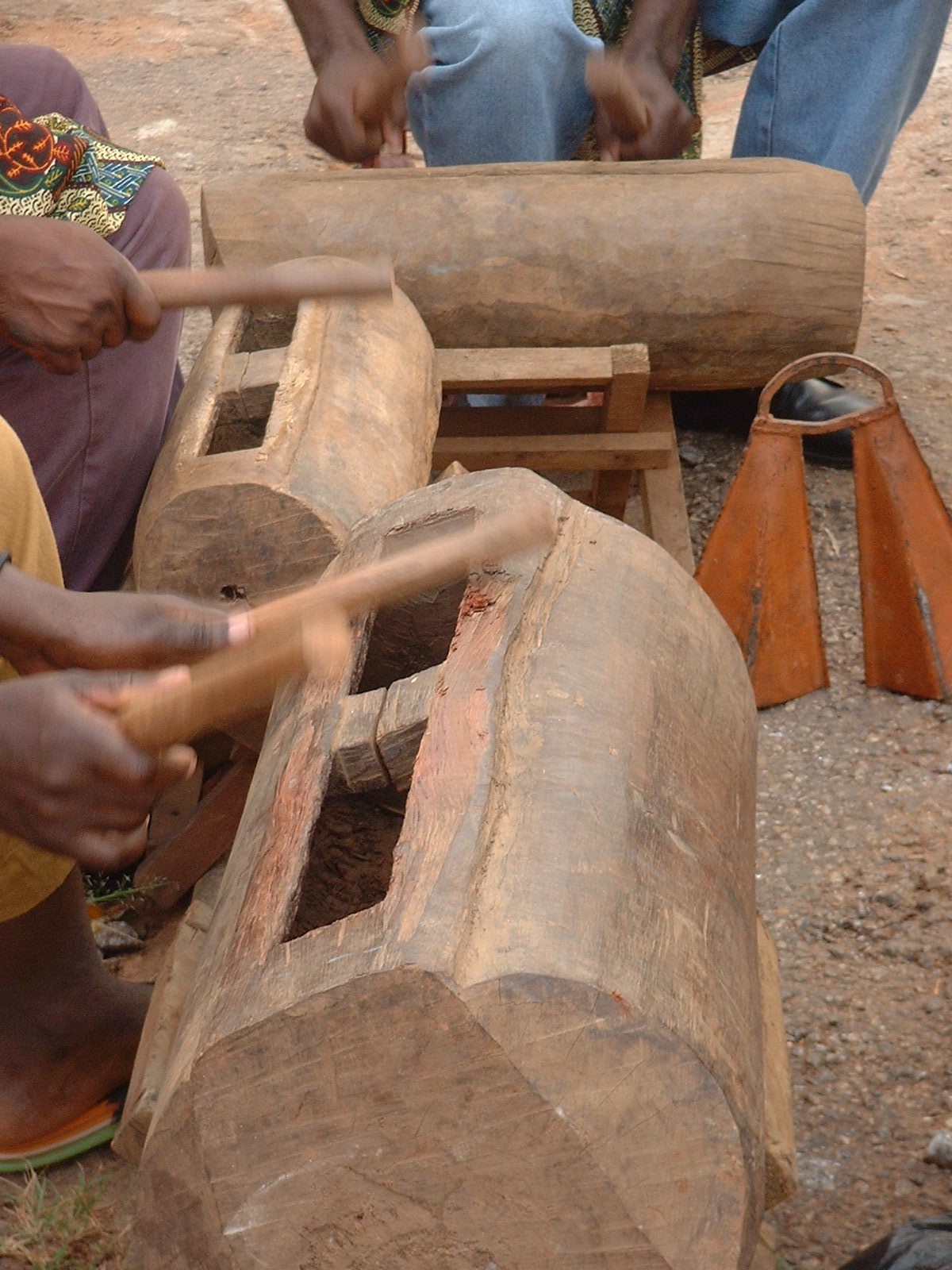|
Ekwe
An Ekwe is an Igbo traditional musical instrument. The ekwe is a type of drum with rectangular cavity 'slits' in the hollowed out wooden interior. The ekwe is made out of wood and most commonly a tree trunk. The ekwe comes in a variety of sizes and designs and each size is determined by the purpose it is being used for. An ekwe can be used for traditional cultural events, or it can be used for music. The ekwe is also used as a type of talking drum The talking drum is an hourglass-shaped drum from West Africa, whose pitch can be regulated to mimic the tone and prosody of human speech. It has two drumheads connected by leather tension cords, which allow the player to change the pitc ... communicating, in the past, with others at long distances. The ekwe's rhythm gives different rhythms from celebration to emergencies. References Igbo musical instruments Idiophones struck directly Slit drums {{Idiophone-instrument-stub ... [...More Info...] [...Related Items...] OR: [Wikipedia] [Google] [Baidu] |
Slit Drum
A slit drum or slit gong is a hollow percussion instrument. In spite of the name, it is not a true drum but an idiophone, usually carved or constructed from bamboo or wood into a box with one or more slits in the top. Most slit drums have one slit, though two and three slits (cut into the shape of an "H") occur. If the resultant tongues are different width or thicknesses, the drum will produce two different pitches. It is used throughout Africa, Southeast Asia, and Oceania. In Africa such drums, strategically situated for optimal acoustic transmission (e.g., along a river or valley), have been used for long-distance communication. The ends of a slit drum are closed so that the shell becomes the resonating chamber for the sound vibrations created when the tongues are struck, usually with a mallet. The resonating chamber increases the volume of the sound produced by the tongue and presents the sound through an open port. If the resonating chamber is the correct size for the pitch b ... [...More Info...] [...Related Items...] OR: [Wikipedia] [Google] [Baidu] |
Drum
The drum is a member of the percussion group of musical instruments. In the Hornbostel-Sachs classification system, it is a membranophone. Drums consist of at least one membrane, called a drumhead or drum skin, that is stretched over a shell and struck, either directly with the player's hands, or with a percussion mallet, to produce sound. There is usually a resonant head on the underside of the drum. Other techniques have been used to cause drums to make sound, such as the thumb roll. Drums are the world's oldest and most ubiquitous musical instruments, and the basic design has remained virtually unchanged for thousands of years. Drums may be played individually, with the player using a single drum, and some drums such as the djembe are almost always played in this way. Others are normally played in a set of two or more, all played by the one player, such as bongo drums and timpani. A number of different drums together with cymbals form the basic modern drum kit. Uses ... [...More Info...] [...Related Items...] OR: [Wikipedia] [Google] [Baidu] |
Igbo People
The Igbo people ( , ; also spelled Ibo" and formerly also ''Iboe'', ''Ebo'', ''Eboe'', * * * ''Eboans'', ''Heebo''; natively ) are an ethnic group in Nigeria. They are primarily found in Abia, Anambra, Ebonyi, Enugu, and Imo States. A sizable Igbo population is also found in Delta and Rivers States. Large ethnic Igbo populations are found in Cameroon, Gabon, and Equatorial Guinea, as well as outside Africa. There has been much speculation about the origins of the Igbo people, which are largely unknown. Geographically, the Igbo homeland is divided into two unequal sections by the Niger River—an eastern (which is the larger of the two) and a western section. The Igbo people are one of the largest ethnic groups in Africa. The Igbo language is part of the Niger-Congo language family. Its regional dialects are somewhat mutually intelligible amidst the larger "Igboid" cluster. The Igbo homeland straddles the lower Niger River, east and south of the Edoid and Idomoid gr ... [...More Info...] [...Related Items...] OR: [Wikipedia] [Google] [Baidu] |
Igbo Musical Instruments
Igbo may refer to: * Igbo people, an ethnic group of Nigeria * Igbo language, their language * anything related to Igboland, a cultural region in Nigeria See also * Ibo (other) * Igbo mythology * Igbo music * Igbo art * * Igbo-Ukwu, a town in the Nigerian state of Anambra * Ijebu Igbo Ijebu Igbo ( Yoruba: Ìjẹ̀bú-Igbó) is a town in Ogun State, Nigeria. It is approximately a 15-minute drive north of Ijebu Ode. Ijebu Igbo, also written as Ijebu-Igbo, is the headquarters of Ijebu North Local Government Authority of Ogun St ..., a town in the Nigerian state of Ogun * Igbo bu Igbo {{Disambiguation Language and nationality disambiguation pages ... [...More Info...] [...Related Items...] OR: [Wikipedia] [Google] [Baidu] |
Idiophones Struck Directly
An idiophone is any musical instrument that creates sound primarily by the vibration of the instrument itself, without the use of air flow (as with aerophones), strings (chordophones), membranes (membranophones) or electricity ( electrophones). It is the first of the four main divisions in the original Hornbostel–Sachs system of musical instrument classification (see List of idiophones by Hornbostel–Sachs number). The early classification of Victor-Charles Mahillon called this group of instruments ''autophones''. The most common are struck idiophones, or concussion idiophones, which are made to vibrate by being struck, either directly with a stick or hand (like the wood block, singing bowl, steel tongue drum, triangle or marimba) or indirectly, with scraping or shaking motions (like maracas or flexatone). Various types of bells fall into both categories. A common plucked idiophone is the Jew's harp. According to Sachs, idiophones Etymology The word is from Ancie ... [...More Info...] [...Related Items...] OR: [Wikipedia] [Google] [Baidu] |



